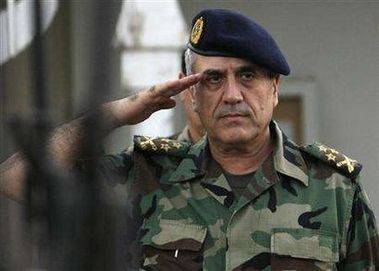 New york times, The political logjam over Lebanon
New york times, The political logjam over Lebanon
An agreement over a new president could clear the way for Lebanon to finally face the thorny issues that rose to the surface in 2005 after Syria ended 29 years of occupation — with Hezbollah’s armed militia at the top of the list.
The Lebanese pro-government Future Parliamentary Bloc agreed on Wednesday to amend the country’s constitution so that the army commander General Michel Suleiman could run for presidency. MP Ammar Houri of the bloc, led by MP Saad Hariri, said in a press statement that the bloc had accepted amending the constitution, especially after Lebanese Maronite Patriarch Nasrallah Sfeir agreed on any candidate out of his list but who "enjoys national consensus for the presidency." "This stand rebukes the accusations … that we caused the(presidency) vacuum or that we try to extend it," Houri said.
On five previous occasions since September 24, parliament has failed to meet to choose a new president amid disputes between the ruling coalition and the opposition On Wednesday, the majority proposed Sleiman and said it was willing to drop its opposition to the constitution being amended to allow his candidacy, in order to spare the country further turmoil.Hezbollah has declared that it would only back Sleiman if Aoun accepted.
The deal could hit a snag in the coming days, politicians and analysts said, but the agreement over General Suleiman is the first time that leaders from every major faction have publicly endorsed a candidate. The vote is set for Dec. 7.
General Suleiman, 59, has won the trust of Hezbollah and the opposition in large measure through his cooperation with the militia since the 2006 war with Israel. The Lebanese Army deployed more than 10,000 soldiers to southern Lebanon after the cease-fire between Hezbollah and Israel, and it has coordinated with Hezbollah’s fighters to minimize friction on the ground.
The army maintained its neutrality in 2005 when street protests toppled the Syrian-sponsored government, and it has remained neutral during the current presidential crisis. General Suleiman responded with an appeal for calm when the departing president in his farewell speech announced that all the conditions were in place for a state of emergency and a military takeover.
If all parties stick to the deal, it could take as little as a day for the government to amend the Constitution, which requires two-thirds approval by Parliament and ratification by the cabinet.
Then Parliament can convene and officially elect General Suleiman as Lebanon’s president.
General Suleiman was appointed army chief of staff in 1998, during the Syrian occupation, and was for a long time maligned by the governing coalition for being too close to Syria.
The members of the governing coalition dropped their objections to General Suleiman after insisting just two weeks ago that they did not want a president drawn, for the second time in a row, from the top ranks of the military.
“We want a president,” said Elias Atallah, a member of Parliament from the pro-American governing coalition. “We are not maneuvering.”
General Suleiman, he said, “has Lebanon’s best interest at heart,” and the pro-Western coalition did not have the support to push through one of its own presidential candidates.
In his announcement on Thursday, General Aoun left open the possibility that he would thwart a final resolution of the political crisis, saying that his followers would engage in peaceful street protests beginning this weekend.
The Syrians did not want to go to Annapolis, and without them the conference would have been a failure and would have weakened the Arabs,” said Talal Atrissi, a political analyst and sociologist at Lebanese University. “The Syrians traded their participation, which did not cost them anything, with a deal on the Lebanese presidency.”
Hilal Khashan, a political science professor at the American University of Beirut, said Syria won a concession from the United States and France in exchange for its appearance at Annapolis. The Syrian government does not expect real progress on negotiations with Israel over the occupied Golan Heights, Mr. Khashan said, but it now expects the United States and France to give Syria more leeway to influence Lebanese affairs.Syria is eager to get out of its stranglehold, it is eager to collaborate with the U.S., to end its isolation,” he said.
An agreement over a new president could clear the way for Lebanon to finally face the thorny issues that rose to the surface in 2005 after Syria ended 29 years of occupation —



